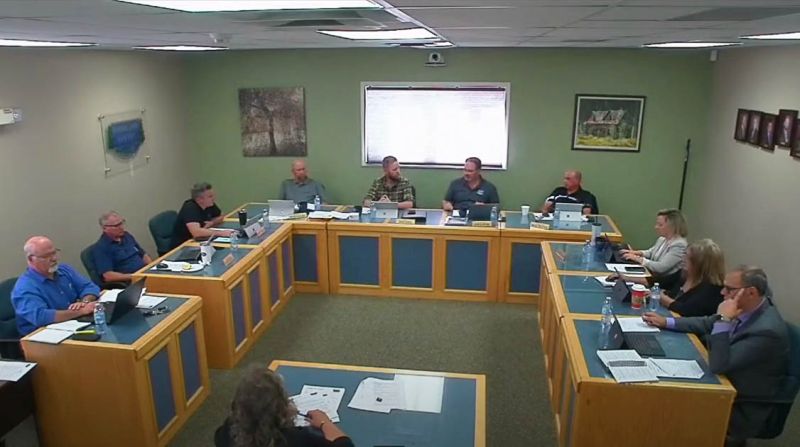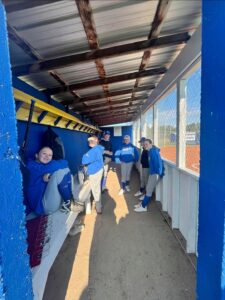Early this summer, Woodlands County Council motioned for their Administration to bring back a revised
version of Policy 62-04 – Relief Assistance for Catastrophic Events. Created in 2008, the policy’s intent at
the onset was to provide $1,000 to a homeowner whose home was destroyed by fire. While discussing
flood-affected homeowners, Council decided to look into updating the policy and include other means
of devastation, like floods or natural disasters. It also raised concerns about what would happen should
a wildfire decimate the County, resulting in a staggering bill.
In mid-August, the County Council received a draft policy with updates. Joan Slootweg, Manager of
Community & Planning Services, said the policy was intended to support in the immediate aftermath of
a house fire, helping a homeowner get a hotel room or personal items. “In 2012, it was amended to then
include, because often it seemed to be that mobile homes were the ones that were being destroyed, an
additional amount of another $1,000 for landfill fees so they could take that destroyed mobile home
and put it to the landfill,” explained Slootweg.
Changes brought forward to Council for the proposed revision included updating the eligibility of what
constitutes a catastrophic event. In the newly created form attached to the policy, residents are asked
for details on what kind of catastrophic event affected their primary residence. Within the definitions
and eligibility portion of the policy, the amendment reads “due to fire, wildfire, flood, weather event, or
other natural disaster.”
A resident seeking support under the policy must be in good standing with the municipality, have
current taxes paid, have not received other financial assistance from the County, like vouchers for
accommodations or food due to evacuation, and only one application can be made per primary resident,
owner or lessee, per lifetime.
Slootweg also provided potential impacts on the budget. “If you looked at the number of residences in
the municipality, and I know this is probably grandiose, but if every residence was destroyed, it would
cost the County about $2,042,000 if you gave each residence $1,000,” she explained.
Councillor Bruce Prestidge asked what the policy would do for someone who lost their home via
flooding. “If somebody’s house was flooded but wasn’t destroyed, they wouldn’t be eligible, right?”
Slootweg said yes. She said it would have to be damage that made the home unliveable. “There are
instances where it fills it up totally with water, and they are out of the house because they can’t live in
it; eligibility would be there.” She said a damaged basement with a liveable top level wouldn’t count.
Councillor John Burrows initially raised the topic of financial support for residents affected by a disaster
at an earlier meeting. His idea was to allow residents who had already paid their yearly municipal taxes
to access the funds to help offset immediate costs, with the onus on the resident to repay the amount
before the following year’s taxes were due. “Last meeting, if you didn’t pay your taxes, you got no
penalties. If you did pay your taxes, well, you paid your taxes, and you had no access to any of that
money. It was an unequal thing,” he explained.
Burrows said he felt the idea behind the policy before him set a “dangerous precedent.” He felt the
County’s risk of being wiped off the map was low for floods. “I can’t see Woodlands getting wiped off
the map by a flood, but a wildfire, I can. Typically, in these types of things, wildfires they actually
exclude. I would like to see this kicked back to the Governance and Priorities Meeting and see if we can
hash through this a little bit.” He said the financial risk to Woodlands County in having to pay out a large
sum by giving each affected homeowner $1,000 wasn’t a good thing.
Council voted unanimously to send the conversation around relief assistance during a catastrophic event
in Woodlands County to an upcoming Governance & Priorities Committee meeting, allowing Council to
delve deeper into the topic and choose the best option for the municipality and residents.
Councillor Burrows then asked what his colleagues thought about bringing the conversation to the
Province. “The Province of Alberta has almost the worst flood mitigation building practices in Canada.
They will let you build just about anywhere.” He said he had recent conversations with members from
the Rural Municipalities of Alberta (RMA) around insurance and uninsurable properties and events,
which led them to discuss the possibility of a provincial insurance fund around floods and wildfires.
Slootweg said the Province changed the Municipal Government Act (MGA) in 2014, specifically for
properties. “They were supposed to provide municipalities with a regulation around development in the
floodway and flood fringes, and that never transpired. I know we have a couple of property owners that
have lobbied the MLA and the higher-ups trying to get the province to reopen that. For whatever
reason, the MGA says there’s a regulation, but there isn’t.”
Councillor Peter Kuelken said it sounded like the ball was being bounced back and forth between who
should be taking responsibility for it. “I think it serves a purpose for us to open that can of worms and try
and figure out whether we can push some of those further up the chain,” he said. He then asked
Slootweg what she thought about putting together a resolution and having it go up the ranks with the
intent of having RMA support it and bring it to the Province.
“I think it would be good to bring it forward again because it is putting us in a situation. We have
individuals, as Burrows indicated, that essentially can’t develop their properties because they are in the
floodway. The province back in the day had promised they would provide a regulation as to some
passive uses these properties could have on them and some conversation around flood fringe areas
where things can be buildup in different matters.”
Reeve Dave Kusch said the best way to get provincial backing was to start a paper trail, adding his
support to the idea. Burrows’ motion to have Administration draft a resolution to RMA around the 2014
regulations and bring it to an upcoming Governance and Priorities meeting for discussion passed
unanimously.








More Stories
Community spirit shines at large-scale youth baseball event
Birthday party chaos sung beautifully by Pumpjack Players’ youth in spring musical
Gearing up for another season of cars, cruising and camaraderie